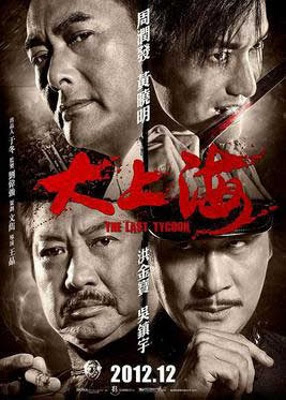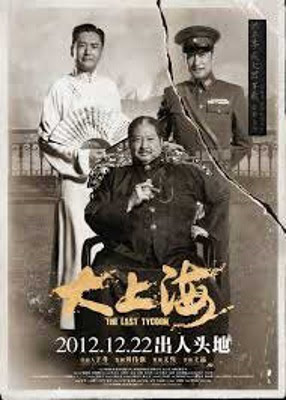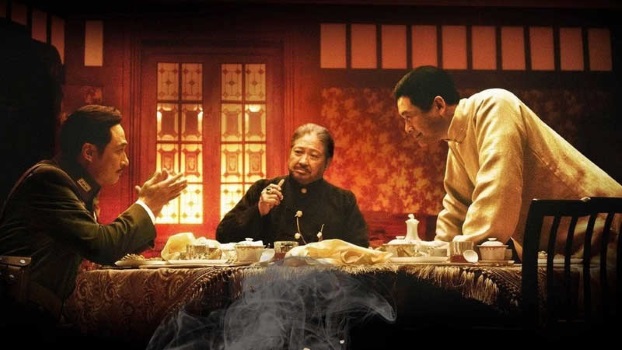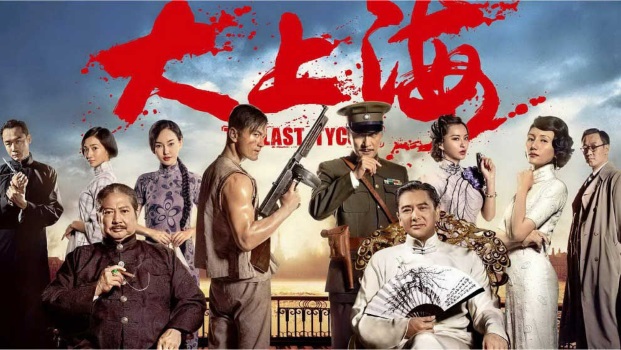The Last Tycoon

Director: Wong Jing
Year: 2012
Rating: 7.0
This is reminiscent of those Hong Kong true crime
films of the 1990s that spanned decades in the life of a criminal based on
a real person. This film is apparently loosely based on the life of the Shanghai
top crime boss Du Yuesheng in the 1920s and 30s, but I think loosely is the
key word. The Hong Kong film Lord of the East China Sea was also based on
Du, but what makes this interesting is that for years any film or book that
mentioned Du was banned in China because of his criminal activities and also,
I would imagine because he allied himself with the Kuomintang. This is a
Mainland production but it very much downplays that aspect of his life while
they turn him into a heroic resister to the Japanese. That certainly plays
well on the Mainland.

It is directed by Wong Jing and I admit
to not having kept up with his career for the past fifteen years but this
feels very unlike the films he made in Hong Kong. Totally serious. Not a
fart or breast joke to be seen. I kind of miss his juvenile humor but perhaps
when you work for a Mainland production company, you leave that stuff in
Hong Kong. This is a well-made film with a large budget and excellent production
values. Too long at 2-hours but with two terrific set-pieces in it. One with
the Japanese bombing of Shanghai and the ending that is part Peking Opera
Blues, part Casablanca and part heroic bloodshed. Earlier there is a scene
that felt like a close cousin to The Killer. Wong brings three great
Hong Kong veteran actors with him that made this feel more Hong Kong than
Mainland. There are even a few syrupy ballads that pop up out of nowhere
like the old HK films had. As the title character Cheng Daqi is played by
Chow Yun-fat in a fine performance - a crook and a killer but an honorable
one, Francis Ng as Mao Zai, a sleaze like Ng used to play all the time and
none other than Sammo as Hong, the big crime boss in Shanghai. Off-hand,
I can't think of Chow and Sammo sharing the screen in another film. Their
careers were just in two different tranches that never intersected.

Since the film begins with Cheng as a young
man and ends with him much older, two different actors are used. For the
early years he is portrayed by Huang Xiaoming, who has a real resemblance
to Chow. He begins as an innocent fruit seller who is in love with an aspiring
opera singer, Yi Zhiqiu, who loves him in return. But he is framed for a
murder and sent to jail where he finds himself in the same cell as Mao Zai
(Ng). When Mao's men break him out, he forces Cheng to kill a man and they
escape to Shanghai. Yi goes to Beijing to learn opera. In Shanghai killing
comes much easier to Cheng and he becomes the protégé of Hong
who runs everything. Things are going fine until 1937 when the Japanese start
trouble. At the same time Yi shows up with her husband who is a secret resistance
fighter. Eventually, Cheng has to decide whether to collaborate with the
Japanese and get wealthy or kill as many as he can for country and friends.
The film drags at times but clearly money was spent on the sets of Shanghai
and large crowd scenes. There are some nice spurts of action and watching
Chow Yun-fat shoot down the enemy in his white suits brings back memories.





